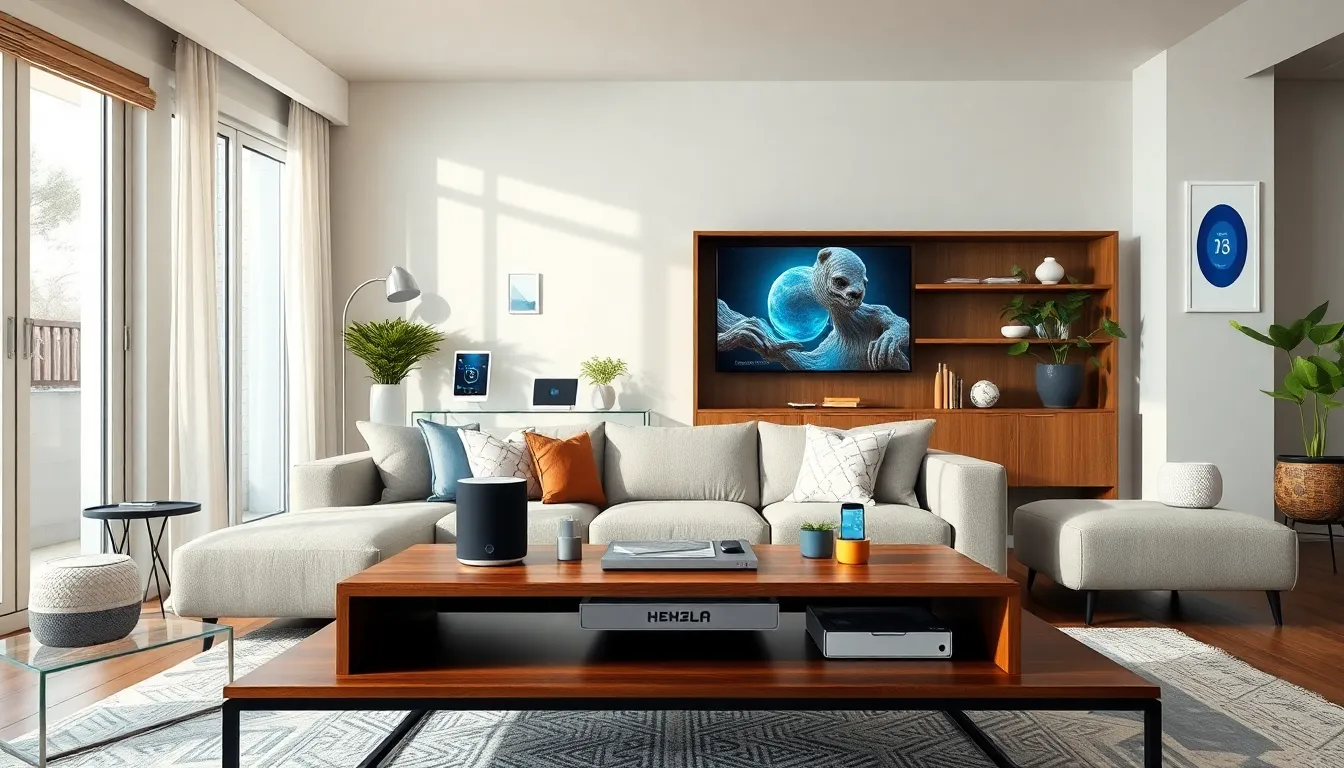Imagine walking into your home and having it respond to your every whim—lights dimming, music playing, and the thermostat adjusting all at your command. Sounds like magic, right? Well, it’s not. It’s the power of a home automation controller, the unsung hero of modern living. This nifty little device turns a regular house into a smart home, making life easier and a whole lot more fun.
With a home automation controller, you can say goodbye to the days of juggling multiple remotes and apps. Instead, you’ll have one central hub to manage everything from your coffee maker to your security system. It’s like having a personal assistant who never takes a coffee break. So, if you’re ready to embrace the future and turn your home into a smart sanctuary, buckle up! The world of home automation is about to get a whole lot more interesting.
Table of Contents
ToggleOverview of Home Automation Controllers
Home automation controllers serve as the central hub for smart home devices. These devices enable users to manage their home systems from a single interface. By integrating various technologies, controllers streamline the operation of lights, thermostats, security cameras, and entertainment systems.
Functionality varies across different models. Some controllers support voice commands, allowing for hands-free operation. Others may focus on automation schedules, letting users set timers for devices to operate at specific times. Compatibility with a wide range of devices is critical, ensuring seamless communication between components.
Security plays a significant role in home automation. Many controllers include advanced encryption and user authentication features, safeguarding personal data and home networks. Routine software updates enhance security and introduce new functionalities.
Mobile applications complement these controllers by offering remote access. Users can monitor and control their home systems from anywhere, providing peace of mind during travel. Integration with virtual assistants, such as Amazon Alexa or Google Assistant, enhances the user experience further by allowing voice control.
Home automation controllers can also create custom scenes. For instance, a “movie night” scene might dim the lights, close the shades, and turn on a specific sound system. This customization offers convenience and a tailored living environment.
Home automation controllers play a vital role in modern smart homes by centralizing control, enhancing security, and providing flexibility. Their ability to integrate various systems significantly improves the efficiency and enjoyment of home environments.
Features to Consider

Home automation controllers offer various features that enhance their effectiveness in managing smart homes. Assessing these features can streamline the selection process for users.
Compatibility with Smart Devices
Compatibility plays a crucial role in home automation. Users must ensure the controller can connect with a wide range of smart devices, including lights, thermostats, and security systems. A broader compatibility range means a seamless integration with existing technology. Prioritizing controllers that support different communication protocols such as Zigbee, Z-Wave, and Wi-Fi ensures flexibility. Check for regular updates to expand device compatibility over time. Reliable controllers often list supported devices on their websites, simplifying the selection process.
User Interface and Usability
User interface design significantly impacts usability. An intuitive interface enhances the overall user experience, making navigation straightforward. Responsiveness within the app or web interface allows for real-time adjustments and monitoring. Prioritize controllers with customizable layouts that cater to personal preferences. Voice control capabilities add another layer of convenience for users. Ensure that the setup process is simple, facilitating quick integration into existing systems. Effective user guides or tutorials increase confidence and usability for all family members.
Popular Home Automation Controllers
Home automation controllers streamline the management of smart home ecosystems. They simplify tasks, enhance convenience, and provide users with a cohesive experience. Below are three popular options available on the market.
Controller 1: Overview and Features
Samsung SmartThings offers extensive compatibility with various devices. Users can connect lights, thermostats, and cameras effortlessly. Features include Z-Wave and Zigbee support, allowing seamless integration across different brands. The intuitive app enhances user interaction, enabling management from anywhere. Voice control with Google Assistant or Amazon Alexa makes operations hands-free, promoting ease of use.
Controller 2: Overview and Features
Amazon Echo Plus stands out for its built-in smart hub capabilities. This device eliminates the need for additional hubs, offering direct management of compatible devices. Users can control lights and thermostats using voice commands, thanks to its integration with Alexa. The Echo Plus also supports Zigbee, which allows for easy connectivity. Regular updates ensure the system remains functional and secure.
Controller 3: Overview and Features
Google Nest Hub takes a different approach with a display interface. It provides visual feedback, making it simple to access information or control devices. Users benefit from voice commands through Google Assistant, facilitating operations across smart devices. Nest Hub also integrates well with multiple ecosystems, from lights to security cameras. Customizable routines create personalized environments, enhancing the smart home experience efficiently.
Benefits of Using a Home Automation Controller
Home automation controllers offer significant advantages for users who want to streamline their living environments. Enhanced convenience stands out as a primary benefit; controlling various devices from a single interface minimizes the hassle of using multiple remotes or apps.
Energy efficiency becomes more attainable with these controllers. They enable users to automate lighting and thermostats, leading to reduced energy consumption and lower utility bills. For instance, scheduling lights to turn off automatically enhances sustainability.
Security features often integrated into home automation controllers improve safety. Many models come equipped with advanced encryption and authentication, protecting personal data from unauthorized access. Users enjoy peace of mind, knowing they can monitor security cameras and receive alerts from anywhere.
Customization offers another key benefit. Users can create tailored scenes that adjust multiple devices at once, such as dimming lights and playing soothing music during movie nights. This personalization enhances the home experience significantly.
Remote access enhances management flexibility. Users can monitor and control their home systems via mobile apps while away, ensuring their home remains secure and efficient. Real-time notifications about important events keep users informed and in control.
Voice control integration adds a layer of accessibility. Many home automation controllers support virtual assistants like Google Assistant or Amazon Alexa, making interactions seamless. This hands-free functionality enhances user experience, especially for those with mobility limitations.
Overall, the advantages of using a home automation controller create a smarter, more enjoyable living environment. These controllers enable users to simplify tasks, improve security, and customize their homes according to individual preferences.
Home automation controllers represent a significant advancement in how individuals interact with their living spaces. By centralizing control over various smart devices, they simplify daily routines and enhance overall comfort. With features like voice command support and customizable scenes, users can create a tailored environment that fits their lifestyle.
The integration of security measures ensures peace of mind while remote access capabilities allow for monitoring from anywhere. As technology continues to evolve, embracing home automation can lead to a more efficient and enjoyable home experience. Investing in a reliable home automation controller is a step toward a smarter future.


